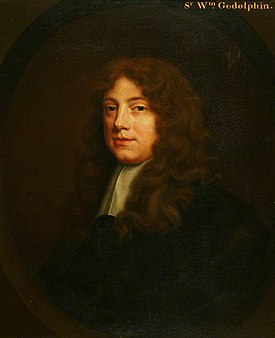William Godolphin (diplomat)

Sir William Godolphin (2 February 1635 – 11 July 1696) was an English diplomat for Charles II and Member of Parliament.
Biography
[edit]Godolphin was third but eldest surviving son of Sir William Godolphin (1605–1663) of Spargor, Cornwall; the eldest son (by Judith Meredith) of John Godolphin (the younger brother of Sir William Godolphin (1567–1613)—and Ruth (died before 1658), daughter of Sir John Lambe of East Coulston, Wiltshire.[1][2]
Godolphin was baptised 2 February 1634,[3] and was educated at Westminster School and Christ Church, Oxford, gaining the degrees of Master of Arts in 1661 and Doctor of Civil Law in 1663. He became a follower of Lord Arlington,[1] and in 1665 he was elected in a by-election to Parliament as member for Camelford, however as he went to Spain early the next year he probably never took up his seat.[4]
After 1662 he was exchanging letters with the correspondent and widow Martha, Lady Giffard.[5] She had been a widow after her first marriage which only lasted for months. She was a Royalist involved with politics as she travelled with her brother living in Brussels in 1667 and later travelling with him to diplomatic meetings in Amsterdam and The Hague leading up to the Treaty of Aix-la-Chapelle. The treaty was signed in 1668 and she and Godolphin lost interest in writing to each other.[5]
In 1667, he took part in the negotiations under Sandwich which resulted in a commercial treaty with Spain. He was knighted in 1668, and in 1669 was sent as Envoy Extraordinary to Madrid, becoming Ambassador in 1672.[1] However, in 1678 he came under suspicion of having been converted to Catholicism, and was recalled; but rather than return to England, he then openly declared his Catholicism, and retired to Spain for the remaining two decades of his life.[1] Shortly before he died, he made a declaration empowering his spiritual advisers, including the procurator-general of the Jesuits, to make his will after his death; an Act of Parliament was passed in 1697[6][7] to declare this and other posthumous wills invalid and to make his nephew Francis and niece Elizabeth heirs on condition that £1,520 was devoted to charity, a charitable act leading ultimately to the foundation of Godolphin and Latymer School, Hammersmith, London and Godolphin School, Salisbury.[8][9][10][11][12]
Samuel Pepys, who met him in 1668, called Godolphin "a very pretty and able person, a man of very fine parts".[1]
Notes
[edit]- ^ a b c d e Leslie 1890, p. 46.
- ^ Venning 2008.
- ^ Leslie 1890, p. 46 cites Maclean, Trigg Minor, ii. 522
- ^ Cruickshanks 1983.
- ^ a b Matthew, H. C. G.; Harrison, B., eds. (23 September 2004). "The Oxford Dictionary of National Biography". Oxford Dictionary of National Biography (online ed.). Oxford: Oxford University Press. pp. ref:odnb/55435. doi:10.1093/ref:odnb/55435. Retrieved 19 January 2023. (Subscription or UK public library membership required.)
- ^ "1697 (9 Will. 3). c. 19 Confirming and establishing the administration of Sir William Godolphin's goods and chattels". legislation.gov.uk. Parliamentary Archives, Houses of Parliament, London. Retrieved 15 September 2018.
- ^ "1697 (9 Will. 3). c. 19 Confirming and establishing the administration of Sir William Godolphin's goods and chattels". textcreationpartnership.org. London: Printed by Charles Bill and the executrix of Thomas Newcomb, deceas'd, 1700, and Ann Arbor: Text Creation Partnership. Retrieved 24 February 2024.
- ^ Leslie 1890, pp. 46–47.
- ^ "Schools: Latymer and Godolphin Schools". British History Online. Institute of Historical Research. Retrieved 15 September 2018.
- ^ "House of Lords Journal Volume 16: 1 April 1698 Pages 253-254". British History Online. Institute of Historical Research. Retrieved 15 September 2018.
- ^ "House of Commons Journal Volume 12: 1 April 1698 Pages 188-189". British History Online. Institute of Historical Research. Retrieved 15 September 2018.
- ^ Douglas, A; Ash, R (eds.). "Elizabeth Godolphin's Will". The Godolphin Book 1726 - 1926. Retrieved 15 September 2018.
References
[edit]- Cruickshanks, Eveline (1983). "GODOLPHIN, William (1635-96), of Spargor, St. Mabyn, Cornw.". In Henning, Basil Duke (ed.). The History of Parliament: the House of Commons 1660-1690. Secker & Warburg. Retrieved 8 September 2012.
- Leslie, Stephen (1890). . In Stephen, Leslie; Lee, Sidney (eds.). Dictionary of National Biography. Vol. 22. London: Smith, Elder & Co. pp. 46–47.
- Venning, Timothy (October 2008) [2004]. "Godolphin, Sir William (bap. 1635, d. 1696)". Oxford Dictionary of National Biography (online ed.). Oxford University Press. doi:10.1093/ref:odnb/10883. (Subscription or UK public library membership required.)
- 1635 births
- 1696 deaths
- English MPs 1661–1679
- Fellows of the Royal Society
- People educated at Westminster School, London
- Alumni of Christ Church, Oxford
- Members of the pre-1707 English Parliament for constituencies in Cornwall
- Ambassadors of England to Spain
- 17th-century English diplomats
- 17th-century English MP stubs
